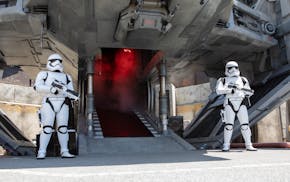Al Jarreau grew up in Milwaukee and earned his big break in California, but the seven-time Grammy-winning jazz singer pointed to his time in Minneapolis as a pivotal step in his career. That five-decade legacy ended Sunday when he died at a hospital in Los Angeles. He was 76.
"I had kind of a lusty one-nighter with Minneapolis," Jarreau laughingly described it in an interview last year.
Recognizable to non-jazz fans for his part in the all-star charity single "We Are the World" and as the originator of the "Moonlighting" TV series theme song, Jarreau had been performing up until last week, when his website abruptly announced his retirement and the cancellation of all his tour dates due to exhaustion.
His manager, Joe Gordon, confirmed his death with a statement sent to Ebony magazine. Gordon said he died surrounded by family and friends, including his wife, Susan, and son, Ryan.
Alwyn Lopez Jarreau was born March 12, 1940, in Milwaukee. His father, originally from New Orleans, was a onetime Seventh-day Adventist preacher, and his mother was a piano teacher.
He had listened from an early age to Nat "King" Cole, Billy Eckstine, Sarah Vaughan and Ella Fitzgerald, but his two greatest influences were jazz scat artist Jon Hendricks and the smooth ballad singer Johnny Mathis.
After singing in church and at Lincoln High School during his Milwaukee childhood, Jarreau wound up performing at the Playboy Club in New York and on "The Tonight Show" in the mid-1960s, but he failed to land a record deal. He and his manager at the time, Shelly Jacobs, returned to Jacobs' hometown of Minneapolis in 1969, and for the next year Jarreau said he enjoyed a great creative spurt.
"What we were doing was a little against the grain, but the [Minneapolis] audience was open to it," he remembered, pointing to his performances at the newly opened nightclub the Depot, now First Avenue. "It was a young, hip audience that was open to new sounds. The entire city at the time really had it going on."
Original Depot/First Ave owner Allan Fingerhut remembered Jarreau was "trying to make up his mind" about becoming a singer or a professional baseball player when he performed at the club. "I think we played a significant role in launching his career, because the audiences really dug him," Fingerhut said.
Jarreau said he wrote his first songs in Minneapolis, and he put together a band that included future "A Prairie Home Companion" bandleader Rich Dworsky — then still a senior in high school — along with Bobby Schnitzer, Dik Hedlund and Bruce Kurnow. They followed Jarreau out to California in 1971, where he eventually signed with Warner Bros. Records.
"It was an exciting time when the music industry was a lot more open to new sounds," said Patrick Rains, a Twin Cities native who then became Jarreau's manager through the 1990s. "Al really pushed the envelope."
Rains pointed to the fact that Jarreau won Grammys in three different genres — jazz, R&B and pop — as proof he was an innovative artist. He released 14 studio albums and numerous live albums, which highlighted his knack for improvisation. His biggest single was 1981's "We're in This Love Together."
Jarreau returned to Minneapolis in later years to visit his brother, Marshall, or collaborate with former St. Paul Chamber Orchestra creative chairman Bobby McFerrin, who joined Jarreau at a 2001 performance at Orchestra Hall with the Minnesota Orchestra. Minnesota musicians who worked with him often noted his friendly professionalism.
"He was one of the sweetest and most genuine guys you could ever meet," Rains said.
Staff writer Jon Bream, the Associated Press, the New York Times and the upcoming book "First Avenue: Minnesota's Main Room" contributed to this report.
Chris Riemenschneider • 612-673-4658
Jerry Seinfeld's commitment to the bit
Music Review: Anitta welcomes listeners into her 'Funk Generation' on new album
Ask Amy: Give up on estranged brother


